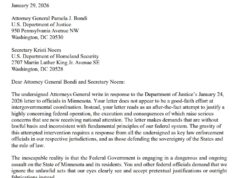How cathartic to listen to the alpha wolves of Wall Street explain themselves to their servants in Congress. How amusing to watch those servants nip at the heels of their disdainful masters. It is a masters class in gingerly executed subservience-on-a-leash. It is a masters class in bilking.
Bilking, it would seem, the universe, of which the wolves styled themselves The Masters. Who were the bilkees? Begin with the immediate clients of the wolves, their fellow big investor-firms domestic and foreign, who likewise imagined themselves to be super-experts in investing, their sophistication so far above the common herd, the sheep, that only they were capable of appreciating the clever, complicated artistry of the instruments peddled to them by the likes of Goldman Sachs, that pinnacle of pinnacles. Next came the customers of the salesmen of those firms, who can be called the running dogs of Wall Street that pretended to be wolves but were a tier or two (or three) down, in among the pack in offices around the globe, who sold these instruments to purchasers like municipal school boards, pension and retirement funds, local governments world-wide, and to individuals everywhere
Over and over we are told these clever, complicated instruments, called “derivatives,” are much too clever and complicated for us, the commoners to understand, but they are somehow necessary to sustain the free flow of capital required to grease the economic mechanism we call capitalism, and clumsy governments should never meddle with that free flow because such meddling (i.e., regulation) would throw sand in the gears of the mechanism and ruin everything, and we’d all be very sorry.
Baloney.
Without getting into the weeds about describing the many varieties of derivatives, how they were formed by clumping together mortgages, securitizing these clumps, slicing them into different categories called tranches, repackaging and selling them as triple-A rated, and without following the tortuous creation of instruments which were nothing more than bets on whether these new securities would rise or fall or go belly-up, all we really need to know is that the result was to create a gigantic casino which had nothing at all to do with encouraging the free flow of capital.
What it did do was to create a paper world economy designed by algorithms on computers paying utterly incredible fees and commissions for those selling the instruments and, for buyers, what seemed to be utterly incredible rates of return, especially from AAA-rated securities. Somehow, the inevitable downside never quite was made as clear as the upside, and the total “value” of these derivatives grew beyond the GDP of the entire world economy, according to some estimates, but really, who could tell? Besides, the fees and bonuses piled up in the coffers of Wall Street and the mansions at The Hamptons as the CEO’s of the investment firms kept pushing the product, the derivatives, harder and harder on the sheep because, frankly, they lusted after the fabulous fees.
Risk-rating? Due diligence? Ha, if you have to ask you can’t afford it. Besides, say the various heads of various Wall Street packs, (paraphrased) “we are all wolves here together, that is, we are all sophisticated smartasses who understood what we were selling, and they knew what they were buying.” The only fault the wolves could find in themselves was that they were maybe “too smart,”according to an analysis by Matt Taibbi of The Guardian(http://www.alternet.org/story/146611). As for the sheep down below, well, caveat emptor.
Whence came this lunacy (what else can you call it when the system which was, basically, designed from the getgo to provide capital to start or improve businesses enhancing the economy, but turned itself into a self-reflecting whirlpool churning money around and around, rewarding the inside churners handsomely, all without creating any actual product of useful value)? Taibbi says it all began with the so-called “objectivist religion, fostered back in the 50s and 60s by ponderous (Russian) emigre novelist Ayn Rand.” He is referring to the author of The Fountainhead and Atlas Shrugged, whose main premise somehow entered the American psyche and endured. That premise, says Taibbi, is:
“the only real morality is self-interest, and society is divided into groups who are efficiently self-interested (ie, the rich) and ‘parasites’ who wish to take their earnings through taxes, which are an unjust use of force.”
Government as such had no “natural” role in society.
Sound familiar? Today’s Tea Baggers (unknowingly) recite the catechism of Rand every day. The catechism embedded itself politically during Reagan’s (“Greed is Good”) reign, and Alan Greenspan literally worshiped at Ayn’s knees, eventually putting her theses into practice as head of the Federal Reserve when he secured passage of the Commodity Futures Act in 2000 which prevented serious regulation of Wall Street, especially of derivatives.
I contend that Rand’s ideas melded seamlessly with those of economist Milton Friedman, whose “Free Market capitalism” theory dominates the World Bank, International Monetary Fund, and America’s two political parties, creating in the process “globalization” and what third world countries regard as the modern form of Western colonialism through finance. What we have today, IMO, is the secular religion of Free Market Capitalism that has sanctified greed and demands the removal of all regulation and accountability, and, in fact, the subordination of government to the service of modern global corporations. To this end, Wall Street and corporations pour money into the pockets and PACs of elected officials, changing their customary donations to Republicans over to Democrats after Obama’s election, and now back to Republicans when Democrats did not prove biddable enough.
It is in this ambience of free-wheeling personal greed that Goldman Sachs operates, so when John Paulson, hedge fund financier, asked them to create a package of “synthetic derivatives” based on mortgages so he could bet against the mortgage market by shorting the package, GS was happy to oblige. GS would “sell the deal to suckers who would be told it was a good bet for a long investment.” The SEC says Goldman Sachs failed to disclose to the suckers, which happened to be European banks, that the entire deal was deliberately set up so the “vulture betting against them” could make money when their purchase tanked and they lost money. Pretty much the same thing happened in the “Greece deal,” when GS used swaps to help the country to mask its precarious finances, then immediately bet against Greece by shorting Greece’s debt (as Paulson shorted the mortgage package).
Both these deals were founded on bilking the suckers… deliberately, to make money by the bushel.
If you think these deals smell to high heaven, you should understand that no disciple of Ayn Rand, no acolyte of Milton Friedman, agrees. Indeed, every Wall Streeter, most of the bought-and-paid-for Senators, most top Republicans, the Tea Partyers, and a raft of pundits and economists all think (more or less privately) that Goldman Sachs deserve kudos for such clever schemes to enhance their own self-interest, which everyone equates with making as big a profit as possible. Remember, GS head Lloyd Blankfein told The Times that he was “doing God’s work.” He believes it. It is not that his greed overwhelmed his honesty or his religious compunctions. Greed is his religion. This religion forgives any amount of shady dealing necessary to bilk (swindle) the less clever. Short-term profits trump long-term planning every time. “If I don’t do it, I am a fool, and some one else will do it first, probably to me.”
Taibbi says the SEC suit against Goldman Sachs crystalizes an American debate between the jungle theories of Ayn Rand and, well, the whole idea of civilization.











